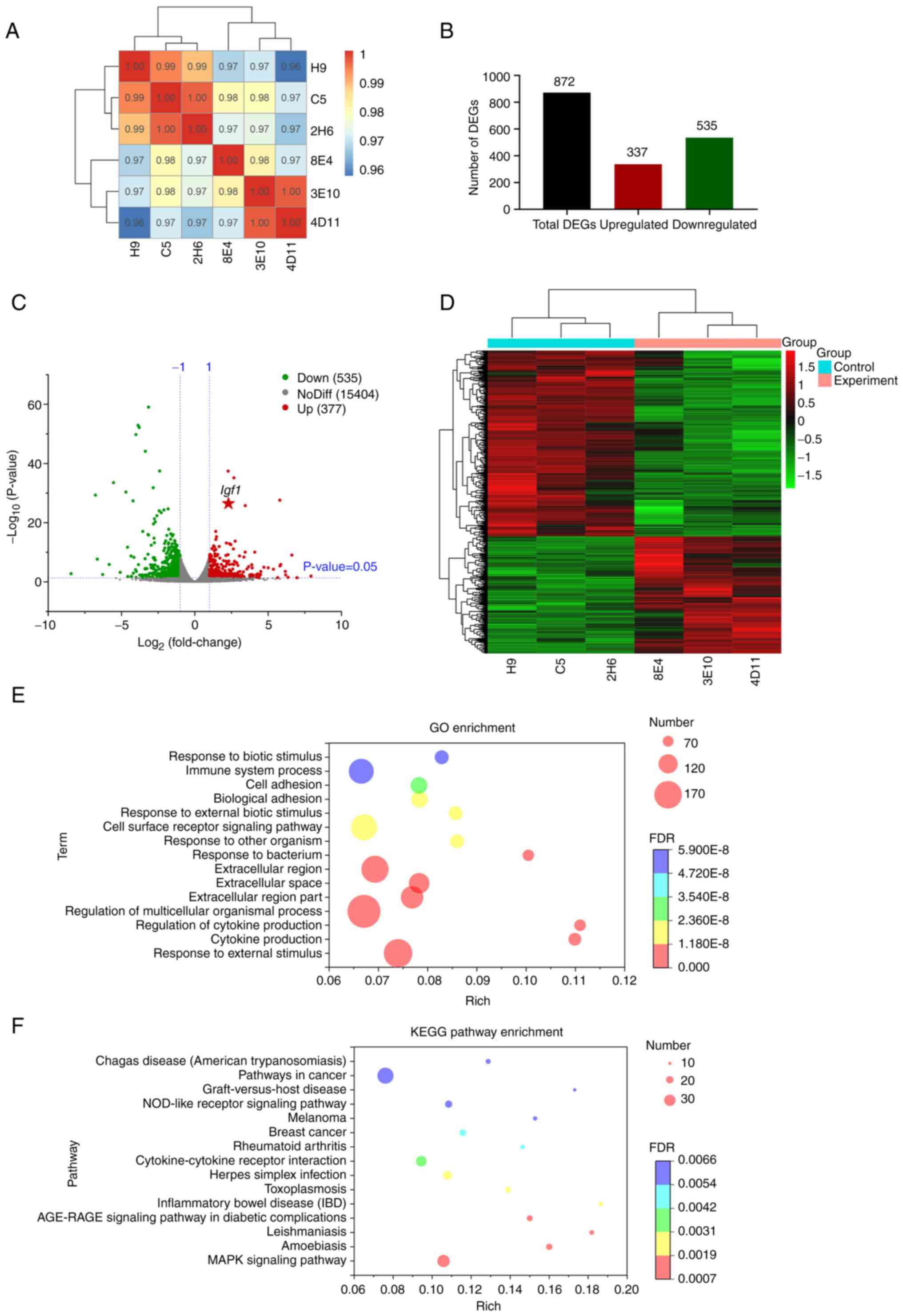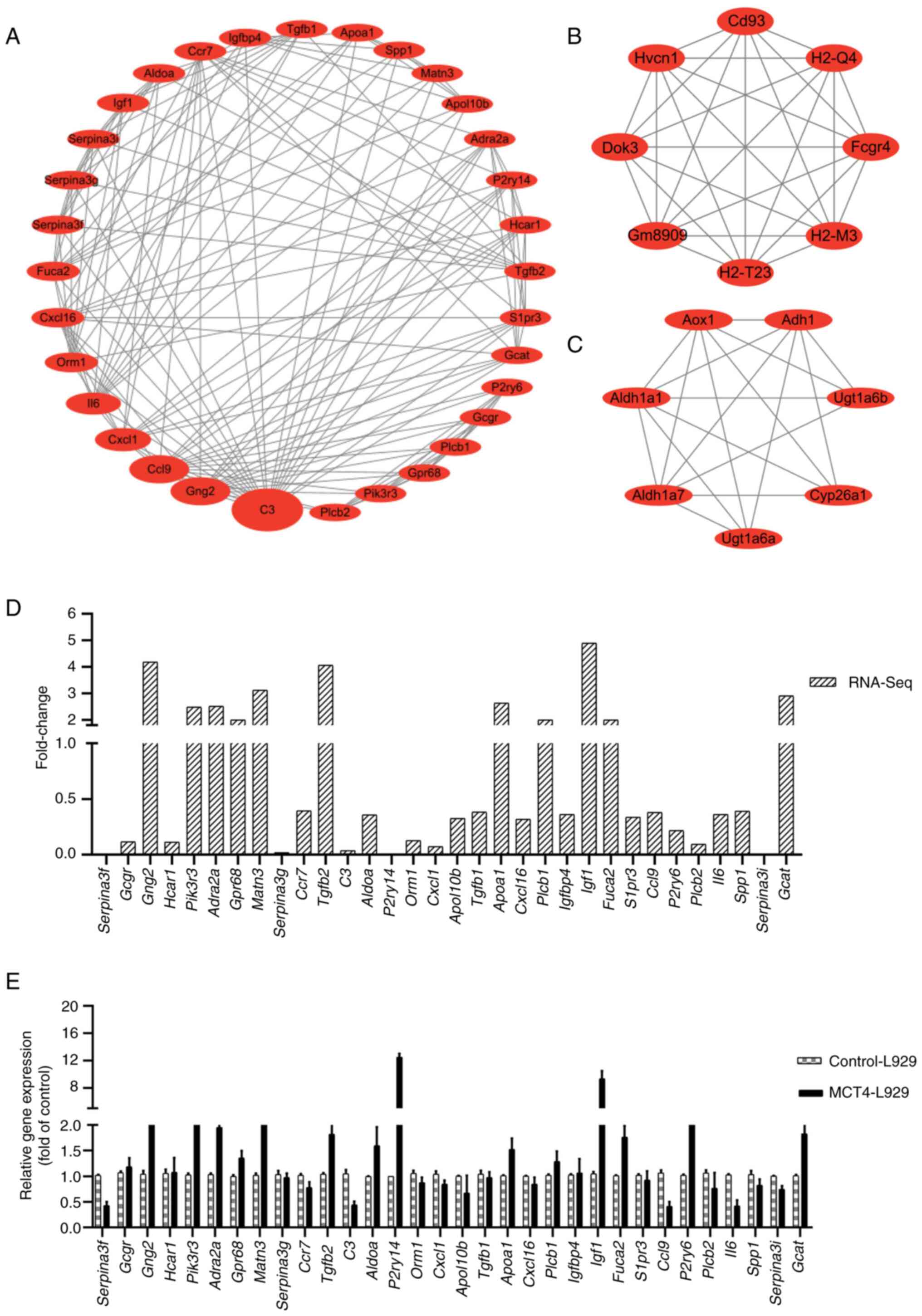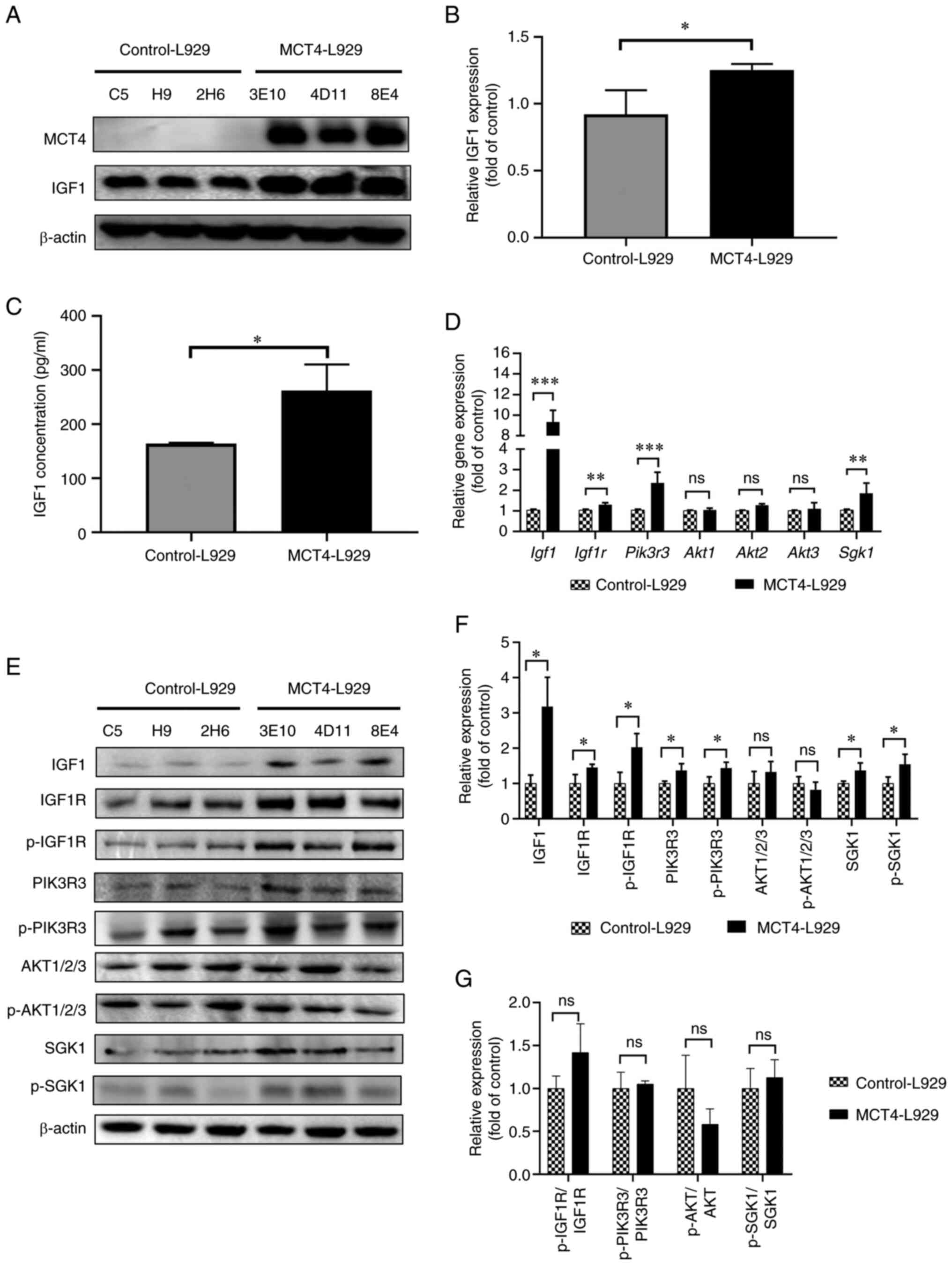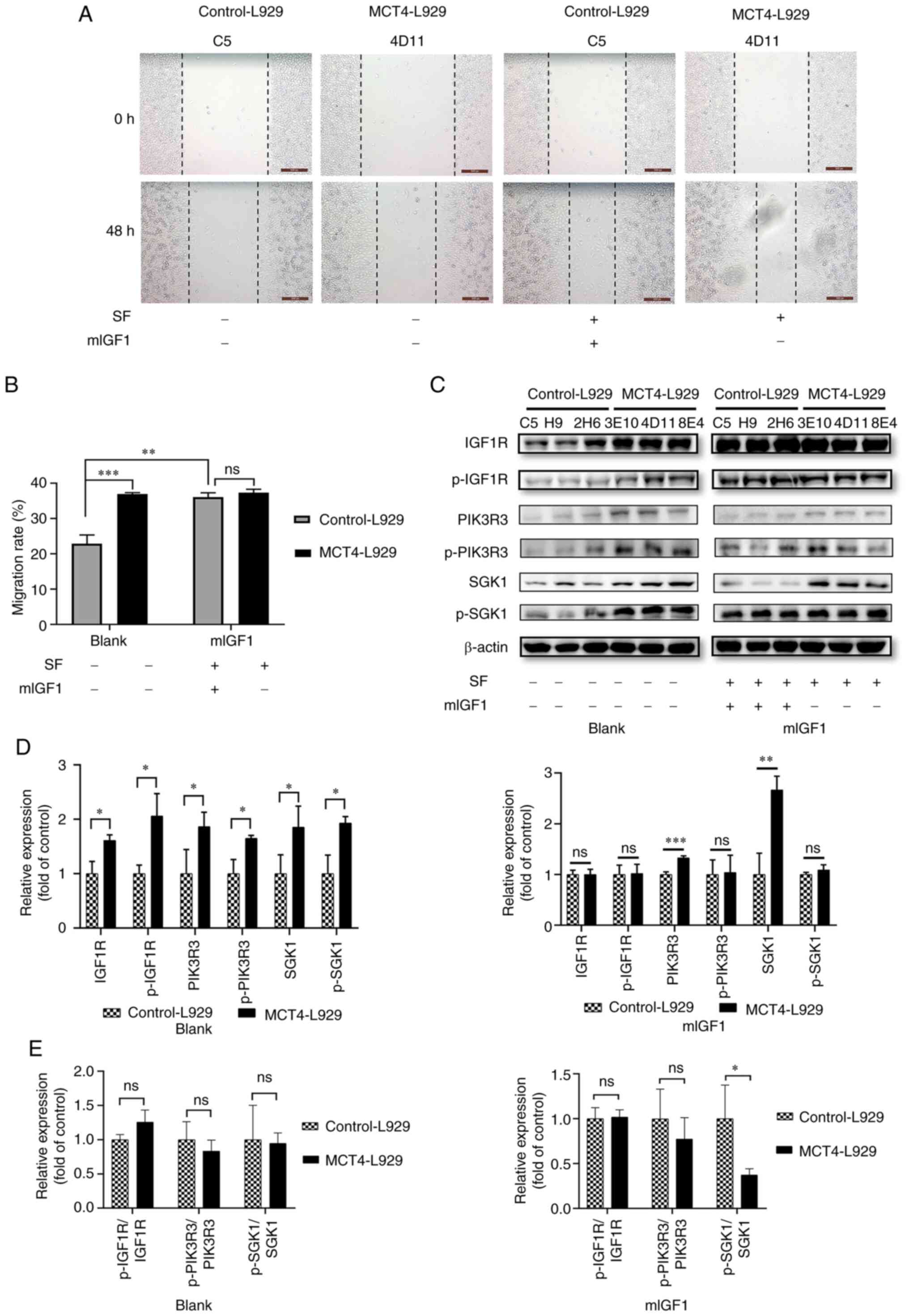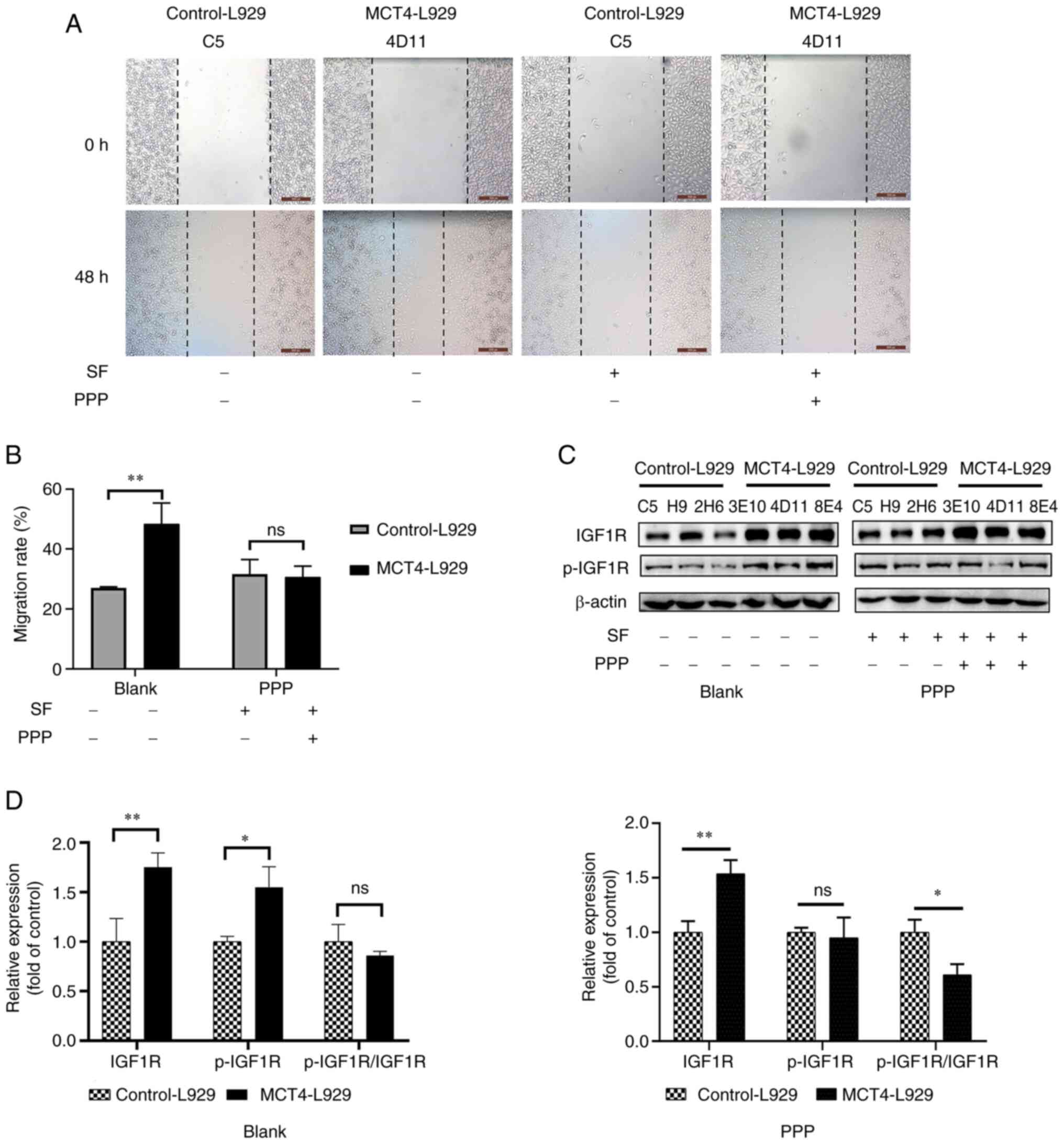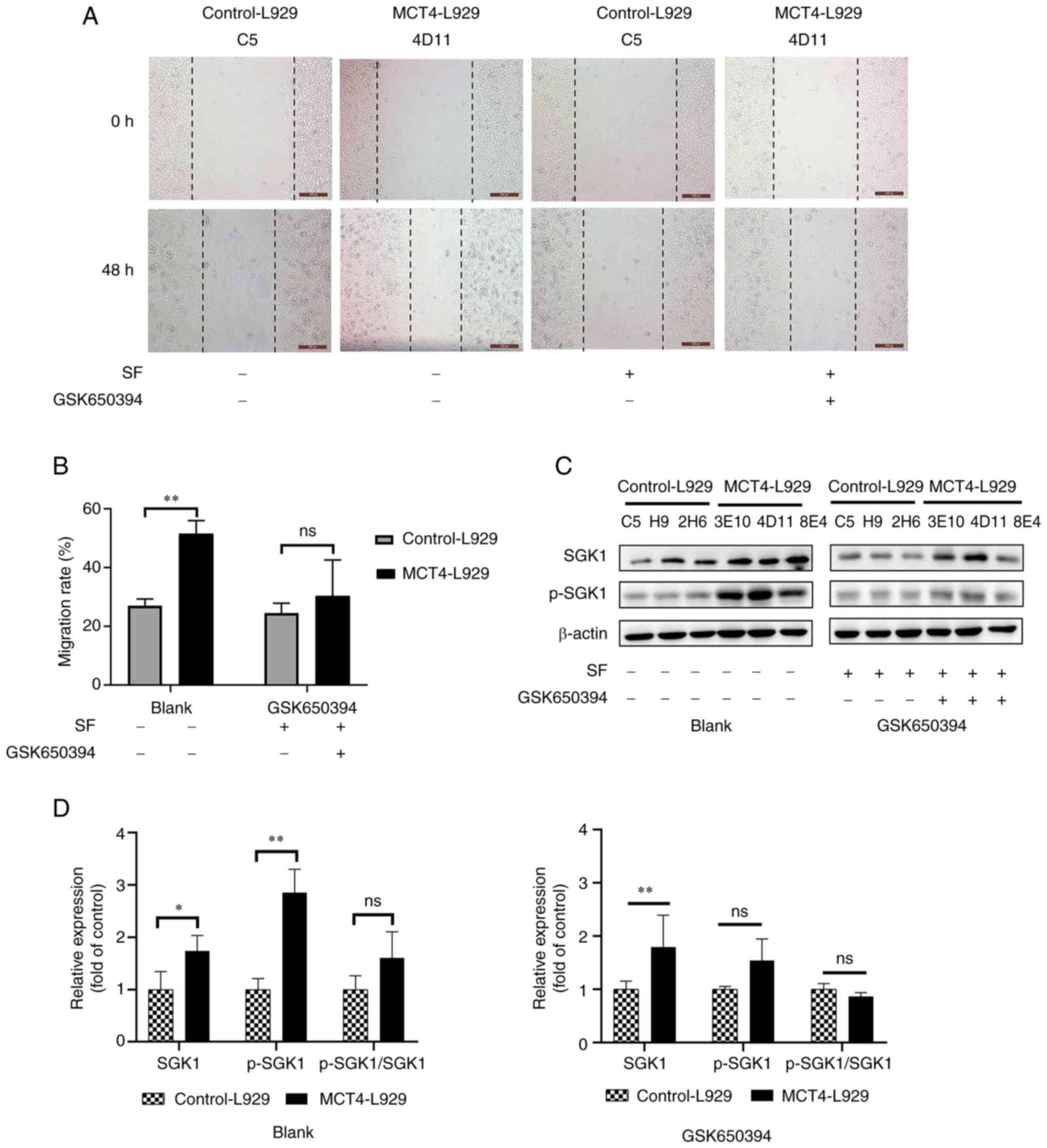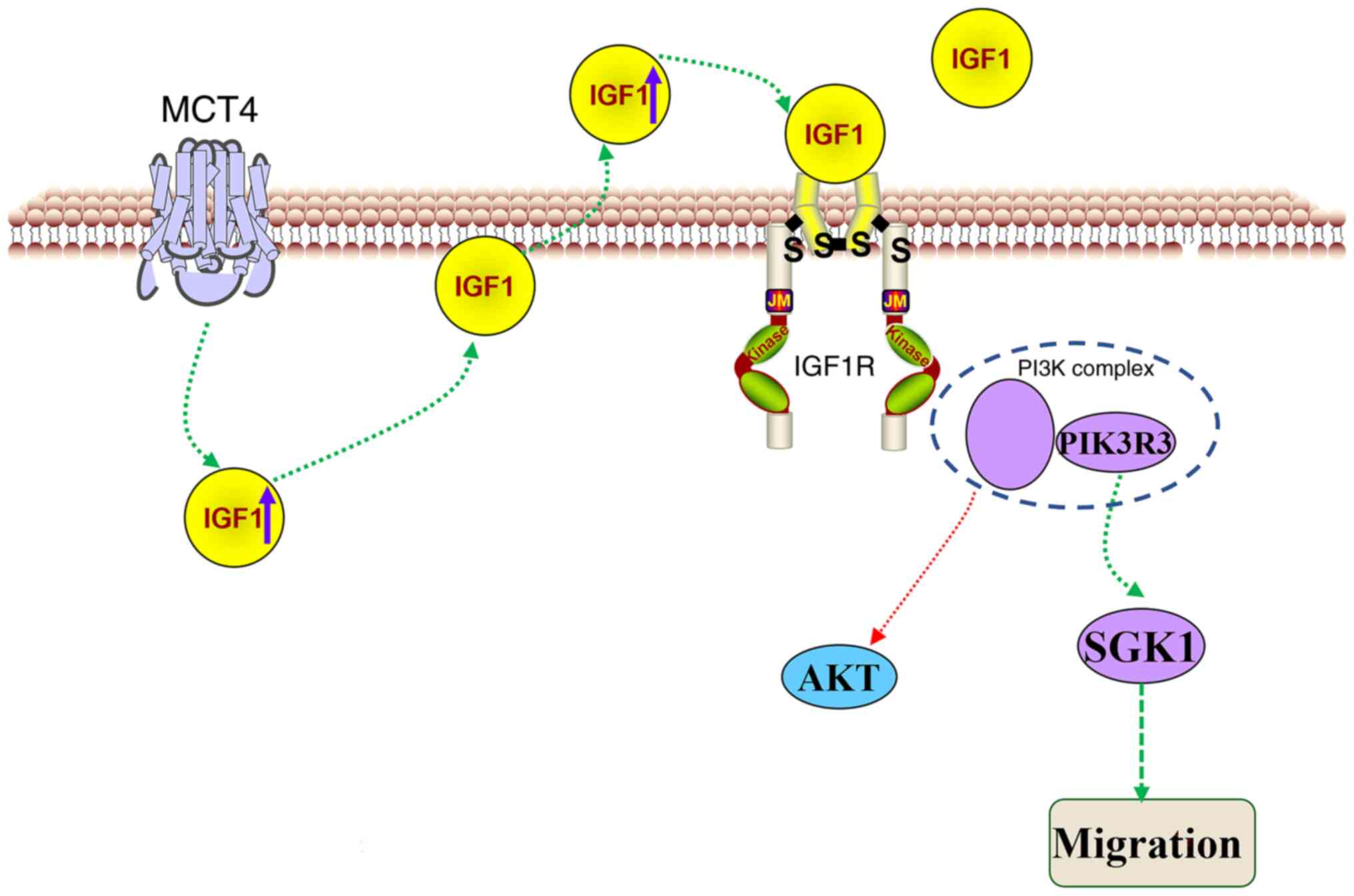|
1
|
Chaffer C and Weinberg R: A perspective on
cancer cell metastasis. Science. 331:1559–1564. 2011. View Article : Google Scholar : PubMed/NCBI
|
|
2
|
Steeg PS: Tumor metastasis: Mechanistic
insights and clinical challenges. Nat Med. 12:895–904. 2006.
View Article : Google Scholar : PubMed/NCBI
|
|
3
|
Wu Y, Zhang T, Zhang X and Gao Q: Decoding
the complexity of metastasis. Cancer Biol Med. 19:284–288. 2022.
View Article : Google Scholar : PubMed/NCBI
|
|
4
|
Nakamura Y, Fujimoto M, Fukushima S,
Nakamura A, Hayashida N, Takii R, Takaki E, Nakai A and Muto M:
Heat shock factor 1 is required for migration and invasion of human
melanoma in vitro and in vivo. Cancer Lett. 354:329–335. 2014.
View Article : Google Scholar : PubMed/NCBI
|
|
5
|
Chiu WT, Shen SC, Chow JM, Lin CW, Shia LT
and Chen YC: Contribution of reactive oxygen species to
migration/invasion of human glioblastoma cells U87 via
ERK-dependent COX-2/PGE(2) activation. Neurobiol Dis. 37:118–129.
2010. View Article : Google Scholar : PubMed/NCBI
|
|
6
|
Ishimura N, Isomoto H, Bronk SF and Gores
GJ: Trail induces cell migration and invasion in
apoptosis-resistant cholangiocarcinoma cells. Am J Physiol
Gastrointest Liver Physiol. 290:G129–G136. 2006. View Article : Google Scholar : PubMed/NCBI
|
|
7
|
Malla RR and Kiran P: Tumor
microenvironment pathways: Cross regulation in breast cancer
metastasis. Genes Dis. 9:310–324. 2022. View Article : Google Scholar : PubMed/NCBI
|
|
8
|
Mosier JA, Schwager SC, Boyajian DA and
Reinhart-King CA: Cancer cell metabolic plasticity in migration and
metastasis. Clin Exp Metastasis. 38:343–359. 2021. View Article : Google Scholar : PubMed/NCBI
|
|
9
|
Hipolito A, Martins F, Mendes C,
Lopes-Coelho F and Serpa J: Molecular and metabolic reprogramming:
Pulling the strings toward tumor metastasis. Front Oncol.
11:6568512021. View Article : Google Scholar : PubMed/NCBI
|
|
10
|
Lu J: The Warburg metabolism fuels tumor
metastasis. Cancer Metastasis Rev. 38:157–164. 2019. View Article : Google Scholar : PubMed/NCBI
|
|
11
|
Jiang B: Aerobic glycolysis and high level
of lactate in cancer metabolism and microenvironment. Genes Dis.
4:25–27. 2017. View Article : Google Scholar : PubMed/NCBI
|
|
12
|
Contreras-Baeza Y, Sandoval PY, Alarcon R,
Galaz A, Cortés-Molina F, Alegría K, Baeza-Lehnert F, Arce-Molina
R, Guequén A, Flores CA, et al: Monocarboxylate transporter 4
(MCT4) is a high affinity transporter capable of exporting lactate
in high-lactate microenvironments. J Biol Chem. 294:20135–20147.
2019. View Article : Google Scholar : PubMed/NCBI
|
|
13
|
Kong SC, Nohr-Nielsen A, Zeeberg K,
Reshkin SJ, Hoffmann EK, Novak I and Pedersen SF: Monocarboxylate
transporters MCT1 and MCT4 regulate migration and invasion of
pancreatic ductal adenocarcinoma cells. Pancreas. 45:1036–1047.
2016. View Article : Google Scholar : PubMed/NCBI
|
|
14
|
Pinheiro C, Reis RM, Ricardo S,
Longatto-Filho A, Schmitt F and Baltazar F: Expression of
monocarboxylate transporters 1, 2, and 4 in human tumours and their
association with CD147 and CD44. J Biomed Biotechnol.
2010:4276942010. View Article : Google Scholar : PubMed/NCBI
|
|
15
|
Choi JW, Kim Y, Lee JH and Kim YS:
Prognostic significance of lactate/proton symporters MCT1, MCT4,
and their chaperone CD147 expressions in urothelial carcinoma of
the bladder. Urology. 84:245e249–215. 2014. View Article : Google Scholar
|
|
16
|
Zhu J, Wu YN, Zhang W, Zhang XM, Ding X,
Li HQ, Geng M, Xie ZQ and Wu HM: Monocarboxylate transporter 4
facilitates cell proliferation and migration and is associated with
poor prognosis in oral squamous cell carcinoma patients. PLoS One.
9:e879042014. View Article : Google Scholar : PubMed/NCBI
|
|
17
|
Dong S, Zheng L and Jiang T: Loss of
Lactate/Proton monocarboxylate transporter 4 induces ferroptosis
via the AMPK/ACC pathway and inhibition of autophagy on human
bladder cancer 5637 cell line. J Oncol. 2023:28303062023.
View Article : Google Scholar : PubMed/NCBI
|
|
18
|
Izumi H, Takahashi M, Uramoto H, Nakayama
Y, Oyama T, Wang KY, Sasaguri Y, Nishizawa S and Kohno K:
Monocarboxylate transporters 1 and 4 are involved in the invasion
activity of human lung cancer cells. Cancer Sci. 102:1007–1013.
2011. View Article : Google Scholar : PubMed/NCBI
|
|
19
|
Gao HJ, Zhao MC, Zhang YJ, Zhou DS, Xu L,
Li GB, Chen MS and Liu J: Monocarboxylate transporter 4 predicts
poor prognosis in hepatocellular carcinoma and is associated with
cell proliferation and migration. J Cancer Res Clin Oncol.
141:1151–1162. 2015. View Article : Google Scholar : PubMed/NCBI
|
|
20
|
Kong S, Nøhr-Nielsen A, Zeeberg K, Reshkin
SJ, Hoffmann EK, Novak I and Pedersen SF: Monocarboxylate
transporters MCT1 and MCT4 regulate migration and invasion of
pancreatic ductal adenocarcinoma cells. Pancreas. 45:1036–1047.
2016. View Article : Google Scholar : PubMed/NCBI
|
|
21
|
Sun Q, Hu LL and Fu Q: MCT4 promotes cell
proliferation and invasion of castration-resistant prostate cancer
PC-3 cell line. EXCLI J. 18:187–194. 2019.PubMed/NCBI
|
|
22
|
Reuss AM, Groos D, Ghoochani A, Buchfelder
M and Savaskan N: MCT4 promotes tumor malignancy in F98 glioma
Cells. J Oncol. 2021:66555292021. View Article : Google Scholar : PubMed/NCBI
|
|
23
|
Li Z, Wu Q and Sun S, Wu J, Li J, Zhang Y,
Wang C, Yuan J and Sun S: Monocarboxylate transporters in breast
cancer and adipose tissue are novel biomarkers and potential
therapeutic targets. Biochem Biophys Res Commun. 501:962–967. 2018.
View Article : Google Scholar : PubMed/NCBI
|
|
24
|
Li X, Zhou X, Liu Y, Fan J, Huo H, Yao J,
Wang L and Ma N: Overexpression of monocarboxylate transporter 4
promotes the migration and invasion of non-carcinogenic L929
fibroblast cells. Oncol Lett. 21:442021. View Article : Google Scholar : PubMed/NCBI
|
|
25
|
Hu D, Zheng Y, Ou X, Zhang L, Du X and Shi
S: Integrated analysis of anti-tumor roles of BAP1 in osteosarcoma.
Front Oncol. 12:9739142022. View Article : Google Scholar : PubMed/NCBI
|
|
26
|
Tang Y, Li M, Wang J, Pan Y and Wu FX:
CytoNCA: A cytoscape plugin for centrality analysis and evaluation
of protein interaction networks. Biosystems. 127:67–72. 2015.
View Article : Google Scholar : PubMed/NCBI
|
|
27
|
Girnita A, Girnita L, del Prete F,
Bartolazzi A, Larsson O and Axelson M: Cyclolignans as inhibitors
of the insulin-like growth factor-1 receptor and malignant cell
growth. Cancer Res. 64:236–242. 2004. View Article : Google Scholar : PubMed/NCBI
|
|
28
|
Bieghs L, Lub S, Fostier K, Maes K, Van
Valckenborgh E, Menu E, Johnsen HE, Overgaard MT, Larsson O,
Axelson M, et al: The IGF-1 receptor inhibitor picropodophyllin
potentiates the anti-myeloma activity of a BH3-mimetic. Oncotarget.
5:11193–11208. 2014. View Article : Google Scholar : PubMed/NCBI
|
|
29
|
Kong YL, Shen Y, Ni J, Shao DC, Miao NJ,
Xu JL, Zhou L, Xue H, Zhang W, Wang XX and Lu LM: Insulin
deficiency induces rat renal mesangial cell dysfunction via
activation of IGF-1/IGF-1R pathway. Acta Pharmacol Sin. 37:217–227.
2016. View Article : Google Scholar : PubMed/NCBI
|
|
30
|
Sherk AB, Frigo DE, Schnackenberg CG, Bray
JD, Laping NJ, Trizna W, Hammond M, Patterson JR, Thompson SK,
Kazmin D, et al: Development of a small-molecule serum- and
glucocorticoid-regulated kinase-1 antagonist and its evaluation as
a prostate cancer therapeutic. Cancer Res. 68:7475–7483. 2008.
View Article : Google Scholar : PubMed/NCBI
|
|
31
|
Mansley MK and Wilson SM: Effects of
nominally selective inhibitors of the kinases PI3K, SGK1 and PKB on
the insulin-dependent control of epithelial Na+ absorption. Br J
Pharmacol. 161:571–588.. 2010. View Article : Google Scholar : PubMed/NCBI
|
|
32
|
Harshitha R and Arunraj DR: Real-time
quantitative PCR: A tool for absolute and relative quantification.
Biochem Mol Biol Educ. 49:800–812. 2021. View Article : Google Scholar : PubMed/NCBI
|
|
33
|
Rodriguez LG, Wu X and Guan JL:
Wound-healing assay. Methods Mol Biol. 294:23–29. 2005.PubMed/NCBI
|
|
34
|
Li Q, Xu L, Li Y, Yang R, Qiao Q, Wang Y,
Wang L, Guo Y and Guo C: P2RY14 is a potential biomarker of tumor
microenvironment immunomodulation and favorable prognosis in
patients with head and neck cancer. Front Genet. 12:6707462021.
View Article : Google Scholar : PubMed/NCBI
|
|
35
|
Cho J, Yusuf R, Kook S, Attar E, Lee D,
Park B, Cheng T, Scadden DT and Lee BC: Purinergic P2Y(1)(4)
receptor modulates stress-induced hematopoietic stem/progenitor
cell senescence. J Clin Invest. 124:3159–3171. 2014. View Article : Google Scholar : PubMed/NCBI
|
|
36
|
Xu T, Xu S, Yao Y, Chen X, Zhang Q, Zhao
X, Wang X, Zhu J, Liu N, Zhang J, et al: P2RY14 downregulation in
lung adenocarcinoma: A potential therapeutic target associated with
immune infiltration. J Thorac Dis. 14:515–535. 2022. View Article : Google Scholar : PubMed/NCBI
|
|
37
|
Meng L, He X, Hong Q, Qiao B, Zhang X, Wu
B, Zhang X, Wei Y, Li J, Ye Z and Xiao Y: CCR4, CCR8, and P2RY14 as
prognostic factors in head and neck squamous cell carcinoma are
involved in the remodeling of the tumor microenvironment. Front
Oncol. 11:6181872021. View Article : Google Scholar : PubMed/NCBI
|
|
38
|
Wang H, Wang X, Xu L, Zhang J and Cao H:
High expression levels of pyrimidine metabolic rate-limiting
enzymes are adverse prognostic factors in lung adenocarcinoma: A
study based on the cancer genome atlas and gene expression omnibus
datasets. Purinergic Signal. 16:347–366. 2020. View Article : Google Scholar : PubMed/NCBI
|
|
39
|
Shah K, Moharram SA and Kazi JU: Acute
leukemia cells resistant to PI3K/mTOR inhibition display
upregulation of P2RY14 expression. Clin Epigenetics. 10:832018.
View Article : Google Scholar : PubMed/NCBI
|
|
40
|
Woods LT, Forti KM, Shanbhag VC, Camden JM
and Weisman GA: P2Y receptors for extracellular nucleotides:
Contributions to cancer progression and therapeutic implications.
Biochem Pharmacol. 187:1144062021. View Article : Google Scholar : PubMed/NCBI
|
|
41
|
Cohen P: Serum insulin-like growth
factor-i levels and prostate cancer risk-interpreting the evidence.
J Natl Cancer Inst. 90:876–879. 1998. View Article : Google Scholar : PubMed/NCBI
|
|
42
|
Wang X, Zhu Q, Lin Y, Wu L, Wu X, Wang K,
He Q, Xu C, Wan X and Wang X: Crosstalk between TEMs and
endothelial cells modulates angiogenesis and metastasis via
IGF1-IGF1R signalling in epithelial ovarian cancer. Br J Cancer.
117:1371–1382. 2017. View Article : Google Scholar : PubMed/NCBI
|
|
43
|
Peyrat J, Bonneterre J, Vennin P, Jammes
H, Beuscart R, Hecquet B, Djiane J, Lefebvre J and Demaille A:
Insulin-like growth factor 1 receptors (IGF1-R) and IGF1 in human
breast tumors. J Steroid Biochem Mol Biol. 37:823–827. 1990.
View Article : Google Scholar : PubMed/NCBI
|
|
44
|
Liu Y, Nelson MV, Bailey C, Zhang P, Zheng
P, Dome JS, Liu Y and Wang Y: Targeting the HIF-1α-IGFBP2 axis
therapeutically reduces IGF1-AKT signaling and blocks the growth
and metastasis of relapsed anaplastic Wilms tumor. Oncogene.
40:4809–4819. 2021. View Article : Google Scholar : PubMed/NCBI
|
|
45
|
Yang L, Tan Z, Li Y, Zhang X, Wu Y, Xu B
and Wang M: Insulin-like growth factor 1 promotes proliferation and
invasion of papillary thyroid cancer through the STAT3 pathway. J
Clin Lab Anal. 34:e235312020. View Article : Google Scholar : PubMed/NCBI
|
|
46
|
Chen ZL, Li XN, Ye CX, Chen HY and Wang
ZJ: Elevated levels of circRUNX1 in colorectal cancer promote cell
growth and metastasis via miR-145-5p/IGF1 signalling. Onco Targets
Ther. 13:4035–4048. 2020. View Article : Google Scholar : PubMed/NCBI
|
|
47
|
Wang H, Tang C, Na M, Ma W, Jiang Z, Gu Y,
Ma G, Ge H, Shen H and Lin Z: miR-422a inhibits glioma
proliferation and invasion by targeting IGF1 and IGF1R. Oncol Res.
25:187–194. 2017. View Article : Google Scholar : PubMed/NCBI
|
|
48
|
Lu X, Song X, Hao X, Liu X, Zhang X, Yuan
N, Ma H and Zhang Z: MiR-186-3p attenuates tumorigenesis of
cervical cancer by targeting IGF1. World J Surg Oncol. 19:2072021.
View Article : Google Scholar : PubMed/NCBI
|
|
49
|
Nagle AM, Levine KM, Tasdemir N, Scott JA,
Burlbaugh K, Kehm J, Katz TA, Boone DN, Jacobsen BM, Atkinson JM,
et al: Loss of E-cadherin enhances IGF1-IGF1R pathway activation
and sensitizes breast cancers to anti-IGF1R/InsR inhibitors. Clin
Cancer Res. 24:5165–5177. 2018. View Article : Google Scholar : PubMed/NCBI
|
|
50
|
Hirakawa T, Yashiro M, Doi Y, Kinoshita H,
Morisaki T, Fukuoka T, Hasegawa T, Kimura K, Amano R and Hirakawa
K: Pancreatic fibroblasts stimulate the motility of pancreatic
cancer cells through IGF1/IGF1R signaling under hypoxia. PLoS One.
11:e01599122016. View Article : Google Scholar : PubMed/NCBI
|
|
51
|
Fürstenberger G and Senn HJ: Insulin-like
growth factors and cancer. Lancet Oncol. 3:298–302. 2002.
View Article : Google Scholar : PubMed/NCBI
|
|
52
|
Matà R, Palladino C, Nicolosi M, Lo Presti
AR, Malaguarnera R, Ragusa M, Sciortino D, Morrione A, Maggiolini
M, Vella V and Belfiore A: IGF-I induces upregulation of DDR1
collagen receptor in breast cancer cells by suppressing MIR-199a-5p
through the PI3K/AKT pathway. Oncotarget. 7:7683–7700. 2016.
View Article : Google Scholar : PubMed/NCBI
|
|
53
|
Zhou J, Chen G, Tang Y, Sinha RA, Wu Y,
Yap CS, Wang G, Hu J, Xia X, Tan P, et al: Genetic and
bioinformatic analyses of the expression and function of PI3K
regulatory subunit PIK3R3 in an Asian patient gastric cancer
library. BMC Med Genomics. 5:1–8. 2012. View Article : Google Scholar : PubMed/NCBI
|
|
54
|
Zhu Y, Zhao H, Rao M and Xu S:
MicroRNA-365 inhibits proliferation, migration and invasion of
glioma by targeting PIK3R3. Oncol Rep. 37:2185–2192. 2017.
View Article : Google Scholar : PubMed/NCBI
|
|
55
|
Sun H and Feng X: MicroRNA-367 directly
targets PIK3R3 to inhibit proliferation and invasion of oral
carcinoma cells. Biosci Rep. 40:BSR201938672020. View Article : Google Scholar : PubMed/NCBI
|
|
56
|
Qi J, Wang WW, Chen W, Lu WY and Shang AQ:
Mechanism of miR-137 regulating migration and invasion of melanoma
cells by targeting PIK3R3 gene. J Cell Biochem. 120:8393–8400.
2018. View Article : Google Scholar : PubMed/NCBI
|
|
57
|
Bruhn MA, Pearson RB, Hannan RD and
Sheppard KE: Second AKT: The rise of SGK in cancer signalling.
Growth Factors. 28:394–408. 2010. View Article : Google Scholar : PubMed/NCBI
|
|
58
|
Sang Y, Kong P, Zhang S, Zhang L, Cao Y,
Duan X, Sun T, Tao Z and Liu W: SGK1 in human cancer: Emerging
roles and mechanisms. Front Oncol. 10:6087222020. View Article : Google Scholar : PubMed/NCBI
|
|
59
|
Liang X, Lan C, Jiao G, Fu W, Long X, An
Y, Wang K, Zhou J, Chen T, Li Y, et al: Therapeutic inhibition of
SGK1 suppresses colorectal cancer. Exp Mol Med. 49:e3992017.
View Article : Google Scholar : PubMed/NCBI
|
|
60
|
Greenawalt EJ, Edmonds MD, Jain N, Adams
CM, Mitra R and Eischen CM: Targeting of SGK1 by miR-576-3p
inhibits lung adenocarcinoma migration and invasion. Mol Cancer
Res. 17:289–298. 2019. View Article : Google Scholar : PubMed/NCBI
|
|
61
|
Liu W, Wang X, Wang Y, Dai Y, Xie Y, Ping
Y, Yin B, Yu P, Liu Z, Duan X, et al: SGK1 inhibition-induced
autophagy impairs prostate cancer metastasis by reversing EMT. J
Exp Clin Cancer Res. 37:732018. View Article : Google Scholar : PubMed/NCBI
|
|
62
|
Zhu R, Yang G, Cao Z, Shen K, Zheng L,
Xiao J, You L and Zhang T: The prospect of serum and
glucocorticoid-inducible kinase 1 (SGK1) in cancer therapy: A
rising star. Ther Adv Med Oncol. 12:17588359209409462020.
View Article : Google Scholar : PubMed/NCBI
|
|
63
|
Zhang Y, Shi G, Zhang H, Xiong Q, Cheng F,
Wang H, Luo J, Zhang Y, Shi P, Xu J, et al: Dexamethasone enhances
the lung metastasis of breast cancer via a PI3K-SGK1-CTGF pathway.
Oncogene. 40:5367–5378. 2021. View Article : Google Scholar : PubMed/NCBI
|
|
64
|
Gallagher SM, Castorino JJ and Philp NJ:
Interaction of monocarboxylate transporter 4 with beta1-integrin
and its role in cell migration. Am J Physiol Cell Physiol.
296:C414–C421. 2009. View Article : Google Scholar : PubMed/NCBI
|
|
65
|
Niu Z, Yang F, Li H, Wang J, Ni Q, Ma C,
Zhu H, Chang H, Zhou X, Lu J and Gao H: MCT4 promotes
hepatocellular carcinoma progression by upregulating TRAPPC5 gene.
J Hepatocell Carcinoma. 9:289–300. 2022. View Article : Google Scholar : PubMed/NCBI
|
|
66
|
Ma J, Sawai H, Matsuo Y, Ochi N, Yasuda A,
Takahashi H, Wakasugi T, Funahashi H, Sato M and Takeyama H: IGF-1
mediates PTEN suppression and enhances cell invasion and
proliferation via activation of the IGF-1/PI3K/Akt signaling
pathway in pancreatic cancer cells. J Surg Res. 160:90–101. 2010.
View Article : Google Scholar : PubMed/NCBI
|
|
67
|
Cheng CJ and Huang CL: Activation of
PI3-kinase stimulates endocytosis of ROMK via Akt1/SGK1-dependent
phosphorylation of WNK1. J Am Soc Nephrol. 22:460–471. 2011.
View Article : Google Scholar : PubMed/NCBI
|
|
68
|
Heinrich T, Sala-Hojman A, Ferretti R,
Petersson C, Minguzzi S, Gondela A, Ramaswamy S, Bartosik A,
Czauderna F, Crowley L, et al: Discovery of
5-2-[5-Chloro-2-(5-ethoxyquinoline-8-sulfonamido)phenyl]ethynyl-4-methoxypyridine-2-carboxylic
acid, a highly selective in vivo useable chemical probe to dissect
MCT4 biology. J Med Chem. 64:11904–11933. 2021. View Article : Google Scholar : PubMed/NCBI
|
|
69
|
Qiang YW, Yao L, Tosato G and Rudikoff S:
Insulin-like growth factor I induces migration and invasion of
human multiple myeloma cells. Blood. 103:301–308. 2004. View Article : Google Scholar : PubMed/NCBI
|
|
70
|
Seo SH, Hwang SY, Hwang S, Han S, Park H,
Lee YS, Rho SB and Kwon Y: Hypoxia-induced ELF3 promotes tumor
angiogenesis through IGF1/IGF1R. EMBO Rep. 23:e529772022.
View Article : Google Scholar : PubMed/NCBI
|
|
71
|
Fukuda R, Hirota K, Fan F, Jung YD, Ellis
LM and Semenza GL: Insulin-like growth factor 1 induces
hypoxia-inducible factor 1-mediated vascular endothelial growth
factor expression, which is dependent on MAP kinase and
phosphatidylinositol 3-kinase signaling in colon cancer cells. J
Biol Chem. 277:38205–38211. 2002. View Article : Google Scholar : PubMed/NCBI
|
|
72
|
Jena B, Das C, Banerjee I, Bharadwaj D,
Majumder R, Das S, Biswas A, Kundu M, Roy PK, Kundu CN and Mandal
M: TGF-β1 induced autophagy in cancer associated fibroblasts during
hypoxia contributes EMT and glycolysis via MCT4 upregulation. Exp
Cell Res. 417:1131952022. View Article : Google Scholar : PubMed/NCBI
|















